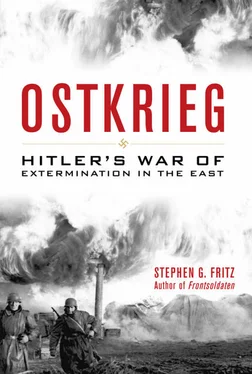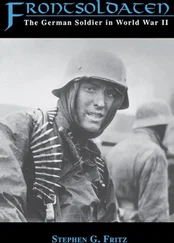Stephen G. Fritz
OSTKRIEG
Hitler’s War of Extermination in the East

Operation Barbarossa

Operation Blau

Stalingrad, September 1942–February 1943

Kursk and Ukraine, summer/fall 1943

Destruction of Army Group Center, summer 1944

Vistula-Oder-Berlin Operations, 1945

Generalplan Ost
Abbreviations and Foreign Terms
AFV — armored fighting vehicle
AK — Armeekorps (army corps)
BA — Bundesarchiv (German Federal Archives)
Bagration — Soviet offensive in Belorussia, June–July 1944
Barbarossa — 1941 invasion of the Soviet Union
Berghof — Hitler’s Bavarian retreat (Obersalzberg)
Blau — Blue, 1942 summer offensive in the Soviet Union
blitzkrieg — lightning war
commissar — political officer attached to Red Army units
Commissar Order — “Guidelines for the Treatment of Political Commissars”; order of 6 June 1941 to shoot Red Army political officers
Edelweiss — advance into the Caucasus, July–November 1942
Einsatzgruppe — mobile killing squad
Einsatzkommando — subunit of an Einsatzgruppe
Fredericus — operation against the Izyum bulge, May 1942
Freikorps — German paramilitary groups
front — Soviet equivalent of an army group
Frühlingserwachen — Spring Awakening, German offensive toward Budapest, March 1945
Gauleiter — Nazi Party regional leader
Generalplan Ost — General Plan East
Gestapo — Geheime Staatspolizei (Secret State Police)
Hiwi — Hilfswillige ( r ), Russian volunteers/auxiliaries who performed noncombat duties with the German army
Kampfgruppe — battle group (usually formed of units seriously reduced in strength)
Kessel — pocket; cauldron
Kesselschlacht — a battle of encirclement
Landser — German infantryman
Lebensraum — living space
Luftflotte — German air fleet
Luftwaffe — German air force
Mars — Soviet offensive against the Rzhev salient (Ninth Army), fall/winter 1942
NSV — Nationalsozialistische Volkswohlfahrt (National Socialist People’s Welfare Organization)
OKH — Oberkommando des Heeres (Army High Command)
OKW — Oberkommando der Wehrmacht (Armed Forces High Command)
Ostfront — Eastern front
Ostheer — Eastern Army
Ostkrieg — Eastern war
panje — Russian horse-drawn wagon
Panther position — proposed German defensive position in the east
Panzerfaust — German one-shot anti-tank weapon
Pz III — German tank, from 1942 with 50 mm antitank gun
Pz IV — mainstay German tank with a long-barreled, high velocity 75 mm gun
Pz V — Panther tank (from 1943, with a long-barreled, high velocity 75 mm gun
Pz VI — Tiger tank (from 1942, with an 88 mm gun)
rasputitsa — lit., time without roads; spring and fall rainy season in the Soviet Union
Reichsführer-SS — Himmler’s title
Reichsmarshall — Goering’s title
Ring — final Soviet offensive against Stalingrad, January 1943
Rollbahn — main highway in the Soviet Union
RSHA — Reichssicherheitshauptamt (Reich Main Security Office)
SA — Sturmabteilung (Storm Troopers)
Saturn — proposed Soviet offensive west of Stalingrad aimed at Rostov, November 1942 (“Little Saturn” actually executed)
Schwerpunkt — focal point of an attack
SD — Sicherheitsdienst (Security Service, part of the RSHA)
Sonderkommando — smaller subunit of an Einsatzgruppe
SS — Schutzstaffel (elite Nazi troops)
Stavka — headquarters, Soviet Supreme Command
Stuka — Sturzkampfflugzeug (German dive bomber; JU-87)
T-34 — Soviet mainstay tank (76 mm, then after 1944 an 85 mm gun)
Taifun — Typhoon, drive on Moscow, October–December 1941
Trappenjagd — Bustard Hunt, operation on the Kerch Peninsula, May 1942
trek — German refugee column
Uranus — Soviet counteroffensive at Stalingrad, November 1942
Vernichtungskrieg — war of annihilation
Viking — Fifth SS Division
Volk — people, nation
Volksdeutsche — ethnic German
Volksgemeinschaft — national community, people’s community
Volkssturm — “People’s Storm” (German national militia)
Waffen-SS — armed or combat SS
Wehrkraftzersetzung — undermining of the war effort
Wehrmacht — German armed forces, often used to refer specifically to the army
Wintergewitter — Winter Storm, operation to relieve Stalingrad, December 1942
Wolfsschanze — Wolf’s Lair (Hitler’s headquarters at Rastenburg, East Prussia)
For decades after the end of World War II, much of our understanding of the German-Soviet war came from the German perspective, for the very good reason that only German documents and archives were readily available. Equivalent Soviet sources were either unavailable, marred by ideology, or limited in their circulation because of language problems. Moreover, the various histories of the Ostfront, or eastern front, that emerged were skewed in other ways as well. Many of the earliest accounts were written by German generals who did not have access to original records but wrote from their own diaries or memories, the latter being, of course, both unreliable and easily distorted over time. In addition, German officers writing either on their own or under the auspices of the U.S. Army’s historical project rather consciously sought to create an image of the Wehrmacht as professionally competent, technically proficient, and, above all, “clean.” In this version of history, which largely confined itself to accounts of battles and military events, not only had the army suffered from Hitler’s megalomania, constant interference, and poor strategic and operational judgments, but its leaders had neither known of nor condoned the massive crimes committed against the Soviet civilian population, especially the Jews. In the narrative the generals created after the fact, the military operations and the massive crimes perpetrated by German forces on the eastern front existed in two separate and parallel spheres, with little interaction between the two. This, of course, was later shown to be a self-serving cover-up, but for a variety of reasons—not least the growing impact of the Cold War—this initial version of events stuck in the Western mind. Thus, standard narratives of the Ostkrieg, the war in the east, available in English primarily focused very narrowly on the sweep of military events and ignored the intersection of the war and Hitler’s overtly ideological, racial, and economic plans for the conquered eastern territories.
Читать дальше



















